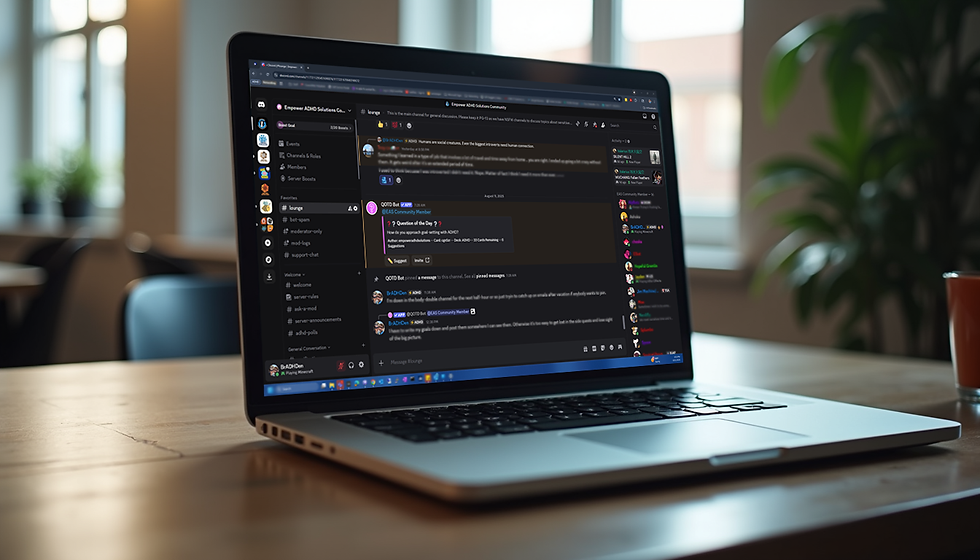Building a Strong ADHD Support Network
- Braden Young
- Aug 11, 2025
- 6 min read
Updated: Aug 13, 2025
When I was first diagnosed with ADHD, I didn’t realize just how much I’d been craving connection with people who truly understood me. That changed when I joined a few online communities such as Jessica McCabe’s How to ADHD online community the Men's ADHD Support Group and eventually starting my own Discord Community. Suddenly, I was surrounded by people who thought, felt, and experienced the world in ways that mirrored my own. People who laughed at the same quirks, celebrated the same tiny wins, and understood the unique frustrations of living with an ADHD brain.
Then in 2023, I attended my first International ADHD Conference. Walking into that space was like stepping into another world. Everywhere I turned, there were people who “got it,” not just in theory but in lived experience. Conversations flowed easily, and for the first time, I didn’t feel the need to explain or defend the way my brain worked. I felt seen.
Those moments changed everything for me. They showed me that a strong support network isn’t just a nice idea. It is life-changing. It is about having a circle of people who understand your challenges, recognize your strengths, and remind you that you are not in this alone.

Why ADHD Support Groups Are a Game-Changer
When was the last time you felt truly seen and understood? Who was there with you in that moment?
Finding your tribe is crucial. Support groups, whether they meet in a cozy coffee shop, a library meeting room, or an online forum, create space where you can drop the mask and be fully yourself. There is something powerful about hearing someone else share a struggle that feels like it was pulled from your own life. You are reminded, it’s not just me.
Here’s why joining an ADHD help group can transform your journey:
Validation and Understanding: When you hear others describe struggles that mirror your own, it’s a relief. You realize you’re not alone or “broken.”
Shared Strategies: Members often exchange tips on managing time, staying organized, or handling overwhelm.
Accountability: Regular check-ins with a group can help you stay on track with goals.
Emotional Support: ADHD can be isolating. Groups offer a safe space to vent, celebrate wins, and get encouragement.
Resource Sharing: From books to apps to coaching services, groups often pool their knowledge to help everyone thrive.
If you’re wondering where to start, check out this adhd support page for a curated list of resources and groups that can help you find your community.

How to Find and Choose the Right ADHD Support Groups for You
Not every ADHD group will feel like your people, and that is okay. Groups, like you, are unique. Finding the right one for you is going to be dependent on where you need to feel supported and seen. If you had a group of people cheering you on, what’s one small task you’d be willing to start for just ten minutes today? Here are some things to look for.
Decide what format works best for you. Do you prefer face-to-face meetings or online communities? Online groups offer flexibility and anonymity, while in-person groups provide deeper personal connections.
What do you need the most support with? Some groups focus on adults with ADHD, others on parents of kids with ADHD, and some on specific challenges like executive function or emotional regulation.
Look for a safe space by looking for groups that are non-judgmental, respectful, and supportive. You need to feel comfortable sharing your story.
You might prefer the closeness of a small group or the variety of a larger one. Online communities can offer flexibility, while in-person groups bring face-to-face connection that is hard to replicate.
Test a few out. Your support system does not have to be one big circle. It can be a patchwork of different spaces that each meet a different need.
Pro tip: Don’t be afraid to try multiple groups. Your support network can be a mix of different communities that meet different needs.

What is the 10 3 rule for ADHD?
The 10 3 rule is a simple but powerful technique to help manage focus and energy when ADHD makes sustained attention tricky. Here’s how it works:
Work for 10 minutes: Set a timer and commit to focusing on a task for just 10 minutes. This short burst feels manageable and less overwhelming.
Take a 3-minute break: After 10 minutes, step away for 3 minutes. Stretch, breathe, or do something enjoyable.
Repeat: Cycle through these intervals to build momentum and avoid burnout.
This method taps into the ADHD brain’s preference for short, intense focus periods and frequent breaks. It’s a practical tool you can use alone or share with your support network to keep each other motivated.
Try this: Use the 10 3 rule during group study sessions or work meetups with your ADHD help group. It’s easier to stick to when you have accountability buddies.

Building Your Personal ADHD Support Network Beyond Groups
Support groups are a great starting point, but your personal network can and should be broader. Who in your life already supports you in small ways? How could you nurture that connection even more? Think friends and family. Educate them about ADHD so they understand your experiences. Ask them for specific support like reminders or patience during tough days.
Consider coaches or therapists who understand ADHD and how it affects your life. If you are like me, you will probably go through a few before you find one that is a good fit.
Look for mentors and role models who have been where you are, and have found a way to thrive with ADHD and can inspire and guide you.
Finding allies in your workplace who help you succeed on your terms by helping to create accommodations or flexible workflows that work with your unique brain instead of against it.
And, of course, there are many online resources such as this blog (and many others out there), podcasts, and websites (like Empower ADHD Solutions) that provide ongoing education and community.
The key is honesty and reciprocity. Keep communication open and regular. Let people know what you need, but also look for ways to support them. That is how a network becomes a community.
Keeping Your ADHD Support Network Strong and Sustainable
Building your network is just the start. Maintaining it requires effort, but the payoff is worth it. Keep it alive by scheduling regular check-ins, whether it's a weekly group meeting, or a monthly coffee with a friend, consistency builds trust. What’s one thing you could do this week to reconnect with someone in your support network?
Allow yourself to be vulnerable and share your struggles and successes. Finding your people means being authentic. This will deepen your connections and allow you to celebrate wins together no matter how big or small. Don’t be afraid to change things up as your needs evolve. It's okay to seek new groups or resources that may be a better fit. Above all, remember that your support network is not there for the polished version of you. It is there for all of you. Remember, everyone has ups and downs. Your network is there to support you through both.
Building a strong ADHD support network is a journey, not a destination. It’s about creating a community that sees you, respects you, and empowers you to thrive on your own terms. The right network will help you see your strengths more clearly, weather your challenges more gracefully, and keep showing up for yourself in ways you never thought possible.
So, who is in your corner? And whose corner are you showing up in? The real magic happens when we remind each other, You are not broken. You are just wired differently, and that is a strength, not a flaw.
If you’re ready to start building your network or want to explore more resources, visit this adhd support page. You deserve a community that lifts you up and helps you shine.
If you enjoyed this article, or if you have any questions, feel free to reach out to me by commenting below, emailing me at Braden@EmpowerADHDSolutions.com, or come join our Discord server, where you can talk to me directly and see the many other resources we have available. Also, be sure to check out the many other resources on our website, https://EmpowerADHDSolutions.com










Comments